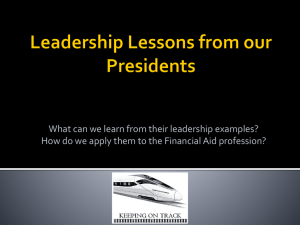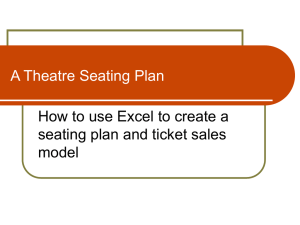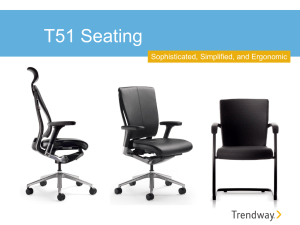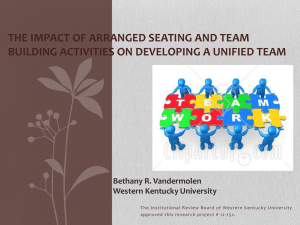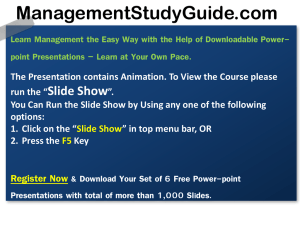9c5bc_Leadership KRR..
advertisement
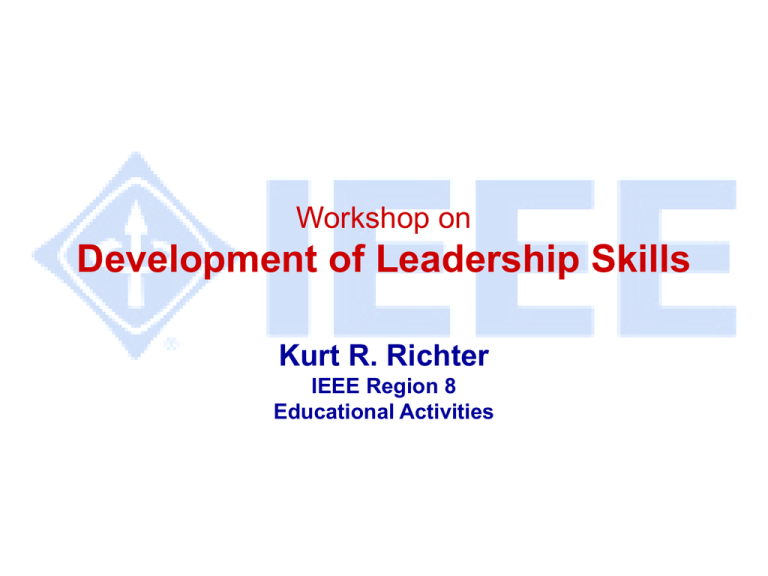
Workshop on Development of Leadership Skills Kurt R. Richter IEEE Region 8 Educational Activities Region 8 Educational Activities What is covered ? The leadership course deals with: interpersonal relations group management team management leadership skills Region 8 Educational Activities WORKSHOP ISSUES 1. Leadership 2. Leadership versus management 3. Holistic communications: the key to leadership 4. Brainstorming 5. Developing a priority list and getting consensus 6. Personal interactive skills: Jungian types 7. Developing group skills Region 8 Educational Activities WORKSHOP ISSUES 8. Active listening: barriers to communicating 9. Persuasion 10. Conflict styles 11. Conflict Management 12. Teambuilding 13. Negotiating commitment 14. Overcoming resistance 15. Making things happen Region 8 Educational Activities Credits Portions of this presentation are derived primarily from the IEEE Leadership Workshop developed by IEEE past president Ray Findlay Additional materials supplied by: Charles Rubenstein [Vice Chair, IEEE-USA PACE Committee] and John Reinert Region 8 Educational Activities [Region 5] Leadership The existence of the leader who is wise is barely known to those he leads. He acts with unnecessary speech, so that people say, “It happened of its own accord.” -Lao Tze (from the 17th Precept) Peter DeLisle suggests Leadership is the ability to influence other people with or without authority Awareness EFFECTIVENESS Ability Commitment Leadership effectiveness depends on three things: awareness, ability and commitment Region 8 Educational Activities What Is Leadership? • Making the right things happen • Inspiring others to achieve a goal • Taking risks, willing to fail to achieve: and … MAKING DECISIONS! Region 8 Educational Activities Definition Leader n, 1. A person who is followed by others. 2. The horse placed at the front in a team or pair. Manager n, 1. A person controlling or administering a business or a part of a business. 2. A person regarded in terms of skill in household or financial or other management. Region 8 Educational Activities Leadership Characteristics • Creator of Culture • Proactive • Change agent (positive) • Cheerleader • Coach • Motivator • Focus Provider Region 8 Educational Activities A Leader… • influences people to follow a course of action through persuasion or example • forms constructive relation- and partnerships with people • spearheads useful changes • transforms mediocre organizations into excellent ones • makes decisions Region 8 Educational Activities You are a Leader if you… • set direction, give guidance, and • • • • • motivate people to accomplish carry out the will of the group is the champion for the group’s cause guide the group during times of storm: (otherwise the group motivation will collapse and the enterprise will fail) delegate well - BUT are not afraid to take the blame Region 8 Educational Activities What do Leaders do? • know what they want, & why and how to • • • • • • communicate to others what they want recognize and praise good work, give credit to others, make everyone feel important communicate well to everyone inspire loyalty support the ideas of others expect the best make coffee… Region 8 Educational Activities TASK #1 • Write down what you hope to accomplish • • that will be truly great. Write out how you are preparing to accomplish your task. Write down the single greatest obstacle that might prevent you from accomplishing your objectives. • You have five (5) minutes to do this Region 8 Educational Activities Some Attributes of a Leader • Guiding vision • Goals • Passion • Integrity • Honesty • Self Confidence • Communication Region 8 Educational Activities • Curiosity • Risk • Dedication • Charisma • Listening • Thinking ? Attributes of a Leader • Guiding vision: Effective leaders know what they want to do, and have the strength of character to pursue their objectives in the face of opposition and in spite of failures. • Goals: The effective leader establishes achievable goals. Region 8 Educational Activities Attributes of a Leader • Curiosity: Leaders are learners. They wonder about every aspect of their charge. They find out what they need to know in order to pursue their goals. • Risk: Effective leaders take calculated risks when necessary to achieve their objectives. If a mistake is made, the effective leader will learn from the mistake and use it as an opportunity to explore other avenues. Region 8 Educational Activities Attributes of a Leader • Dedication: The effective leader is dedicated to his or her charge, and will work assiduously on behalf of those following. The leader gives himself or herself entirely to the task when it is necessary. • Charisma: This may be the one attribute that is the most difficult to cultivate. It conveys maturity, respect for your followers, compassion, a fine sense of humor, and a love of humanity. The result is that leaders have the capability to motivate people to excel. (see next slide) Region 8 Educational Activities Charisma • • • • charisma is recognized as a major leadership quality to lead others without charisma puts the leader at a disadvantage many of the qualities associated with charisma can be developed most effective method of developing or enhancing charisma include learning to express the feelings more assertively and becoming more enthusiastic, optimistic and energetic Region 8 Educational Activities Attributes of a Leader • Listening: Leaders Listen! This is the most important attribute of all, listen to your followers. • Passion: Effective leaders believe passionately in their goals. They have a positive outlook on who they are, and they love what they do. Their passion for life is a guiding star for others to follow, because they radiate promise! There is a difference between emotion and passion, let’s see where YOU fit in… Region 8 Educational Activities Task #2 Emotional Expressiveness Do not write your name on the questionnaire since it contains your most personal data. Circle the number you feel appropriate To obtain the total score add the numbers you encircled Region 8 Educational Activities Emotional Expressiveness Scale 90-100: Your level of emotionality could be interfering with your charisma. Many others interpret your behavior as out of control. 70-89: Your level of emotionality is about right for a charismatic individual. You are emotionally expressive, yet your level of emotion is not so intense as to be bothersome. 10-69: Your level of emotionality is probably too low to enhance your charisma. To become more charismatic and dynamic, you must work hard at expressing your feelings. Region 8 Educational Activities Emotional Expressiveness Scale From your total score you can judge how much development you need to become emotionally expressive. People who want to improve their leadership effectiveness often need to enhance their emotional expressiveness. They might need to learn how to express feelings in more constructive way to be truly charismatic. Emotional expressiveness may contribute to charisma only 90 percent of the time. Note Bene: The principles of leadership are not as accurate as those for chemistry or physics. Region 8 Educational Activities Self-Confidence How can you build up your self-confidence? • Think positive thoughts about yourself • Write down your good points to boost your self-confidence • Visualize a more powerful you • Follow a few easy victories with bigger challenges • Deal creatively with the emotional turmoil associated with adversity Region 8 Educational Activities Thinking Leaders • pay attention to their intuition • recognize the importance of being a big thinker for effective leadership • ask tough questions • enhance their ability to read people whenever possible Region 8 Educational Activities Communication Leaders use • heavy-impact, embellishing language • metaphors, analogies, and anecdotes for inspiring group members • skillfully body language • power-oriented language style for a comprehensive approach avoid detractors such as junk words, vocalized pauses, insipid clichés threadbare anecdotes, and turning to many nouns into verbs Region 8 Educational Activities Power In order to increase their power leaders • develop a network of people with power • work on critical organizational problems • perform well on small projects • form coalitions as a sophisticated method • try to make an outside expert to agree with your position Region 8 Educational Activities • • • • Multicultural Leader develops his cultural sensitivity by observing and understanding cultural differences appreciates the wide variety of people who fit under the diversity umbrella, such as recognizing that workers differ from one another recognizes differences in cultural attitudes and values in such dimensions as formality versus informality and attitude toward time establishes a good strategy for motivating people from different cultures including identifying their motivation Region 8 Educational Activities Attributes of a Leader • Integrity: Because they know who they are, effective leaders are also aware of their weaknesses. They only make promises they can follow through on. • Honesty: Leaders convey an aura of honesty in both their professional and their personal lives. Effective leaders earn the trust of their followers and act on behalf of their followers. Region 8 Educational Activities Task #3 Assessing your Ethical Belief Questionnaire 20 Questions (1 to 5 points) Do not write your name on the questionnaire since it contains your most personal data . Circle the number you feel appropriate to obtain the total score add the numbers you encircled. You have five (5) minutes to do this Region 8 Educational Activities Ethical Reasoning Inventory Scoring and interpretation: • 90-100: • 60-89: • 41-59: • 20-40: You are a strongly ethical person who may take a little ribbing from coworkers for being too straitlaced. You show an average degree of ethnical awareness and therefore should become more sensitive to ethical issues Your ethics are underdeveloped, but you at least have some awareness about ethical issues. Your ethics are far below contemporary standards in business. Begin a serious study of business ethics. Region 8 Educational Activities The Image of a Leader Region 8 Educational Activities Image • I'mage (noun) 1. form, semblance; counterpart as regards appearance (That person is the image of an engineer.) • 2. simile, metaphor; mental representation; idea, conception; character of thing or person as perceived by the public. Image includes everything: the way you talk and dress the way you act your attitude to others at work and play. Region 8 Educational Activities What are your personal career objectives? 1. to identify problems and create winning solutions to solve them? 2. to lead effectively, with inspiration; to motivate? 3. to be in control of your world; to make things happen for you? 4. to manage your personal resources effectively? 5. to be the president of your own company? 6. to be a millionaire, if you aren't already? Region 8 Educational Activities Who are you? Do you give warm fuzzies? Do you smile a lot? Do you feel dynamic and energized, and show it? Do you feel comfortable in a group? Or: do you hand out cold pricklies? Do you frown a lot? Do you feel tired and drained of energy, and show it? Do you feel uncomfortable in a group? Region 8 Educational Activities What’s your image? When people think about you, do they equate your image with a dynamic, interested, competent person? Are you the sort of person who makes things happen, at home, at work or at play? Or: do people think you are merely occupying a spot in the universe? That you are waiting for the next millennium? Are you the sort of person who waits for someone else to make things happen? Region 8 Educational Activities The way you stand or sit: 1. indicates whether you are an open person, easily approachable. 2. says whether you are friendly 3. tells others whether you could be a good team player 4. suggests that you are frank and honest 5. tells others what you really think of them shows whether you are part of the team Region 8 Educational Activities The way you dress: 1. indicates whether you have conventional ideas or whether you are “a radical” 2. shows how neat you are 3. suggests whether you will fit in with the company's image 4. makes a statement about whether or not you care enough to find out about the company, its image and its objectives 5. shows indirectly whether you are confident, whether or not you believe in yourself Region 8 Educational Activities The way you write conveys: 1. whether you are warm and friendly or appear cool and reserved 2. whether you are dynamic and energetic or are lethargic and procrastinate 3. an image of you as either intuitive in solving problems, or logical, solving problems step by step 4. whether or not you want to communicate with others 5. whether you try to avoid conflict or seek it 6. whether you are materialistic or idealistic Region 8 Educational Activities Conclusions: Communication 1. communication is a holistic concept: every thing we do conveys something about ourselves 2.if you want to achieve greatness in your chosen objectives you must communicate holistically. It is not enough to write well or to know a lot of big words. You must be able to project an image that will lead to success Region 8 Educational Activities Conclusions: Behavior 3. You can change your behavior pattern by changing the way you appear to others 4. If you want to change your behavior pattern, you must change everything about yourself Region 8 Educational Activities What is the bottom line? 1. You are in control of your environment! You can make every setback an opportunity for success. 2. You can be anything you can be! Whatever you want to be is entirely up to you. 3. Become the person you want to be! Dress like that person, talk like that person, act like that person, write like that person, and that will be you. Region 8 Educational Activities Leader versus Manager Region 8 Educational Activities Management and Leadership Management Leadership Coping with Complexity Coping with Change Planning and Budgeting Setting a Direction Organizing and Staffing Aligning People Controlling and Problem Solving Motivating and Inspiring John Kotter: Harvard Business Review, May-June 1990 Region 8 Educational Activities Leadership versus Management How does a leader differ from a manager? Managers, have the following attributes, they develop a vision for the enterprise. consider alternatives to design. estimate costs involved. establish risks to the organization. develop a schedule for the project. include decision steps. Region 8 Educational Activities Managers… perform administrative tasks. report to senior management. money and job security play a major role in management effectiveness - they act as deficiency motivators. Region 8 Educational Activities Leaders… • Manage change in an orderly fashion. • Keep the team motivated and informed. • Review responsibilities and goals with each team player. • State clearly the basis for evaluation and where each person fits in the organization. Region 8 Educational Activities A Leader will: Monitor progress. Set directions set expected achievements for each individual within the next work period. Show the team members where they fit in achieving unit goals. Region 8 Educational Activities Ask Yourself... • Are you satisfied with your career? • Do you know what you want to accomplish? • Are you accomplishing all you can? • Are you an effective leader? • Do you want to grow in your career and as a • • person? Do you know what you have to do? Are you happy? Region 8 Educational Activities Being a Leader, Being a Boss If you want to get ahead, be a leader, be a boss, or be a better boss assume: o That everything that happens to you results in a situation that is within your control. o That the attitude you convey is what you are judged on. o That what you think and do in your private life is what you will reap in your public or corporate life. o You are what you think - and believe. o If you never meet a challenge you will never find out what you are worth. Region 8 Educational Activities A Recipe for Being the Boss Take control of your life. Assume responsibility for who you are. Convey a positive and dynamic attitude in everything you do. Accept blame: learn from your own mistakes as well as those of others. Take blame for everything that happens in your unit. Give credit wherever it is due. Region 8 Educational Activities A Recipe for Being the Boss Be compassionate when you review your team members' progress or lack thereof Think great thoughts. Small thinking is why companies go broke. Turn disasters into opportunities. Turn every obstacle into a personal triumph. Determine your "real" goals then strive to achieve them. When you want to tell someone something important, do it personally. Region 8 Educational Activities Brainstorming Region 8 Educational Activities Brainstorming: The Objectives Identify the issues rapidly Reach consensus on the most important issues rapidly Determine possible solutions to issues Select the most promising action to solve the problem Agree on who does what Get a commitment Sell the process Region 8 Educational Activities Brainstorming: Your Goals 1. Everyone must be involved 2. Call out ideas to scribe 3. Build on ideas 4. No idea is too trivial or silly 5. Apply no criticism nor judgment on any idea 6. Get as many ideas as possible in the time 7 Objective: solve problems and enjoy, doing it! Region 8 Educational Activities TASK #4 Case Study: Creative Enterprises • You will brainstorm in your groups on possible actions Alf might take to revitalize the company according to the following guidelines for about 30 minutes… Region 8 Educational Activities Brainstorming: Process Guideline 1. 2. 3. 4. 5. 6. Read the Case Study (5 Minutes). Break into groups of up to 5 or 6 people. Each group appoints a moderator, a scribe and a speaker: Moderator moves the discussion along, Scribe writes short descriptive phrases to describe each idea on a Post-it, Speaker will present the group’s results Brainstorm to develop ideas (20 minutes). Arrange the ideas in priority order. Report out the group’s results (5 Minutes). Region 8 Educational Activities Personal Interactive Skills Jungian Type Region 8 Educational Activities Personality Indicators • Carl Jung (1875 - 1961): Formulated ideas • about personality in terms of types of characteristics. Katherine Briggs & Isabel Briggs Myers: “Manual: A Guide to the Development and Use of the Myers-Briggs Type Indicator Consulting Psychologist Press, 1985” Region 8 Educational Activities Observing Myers-Briggs Types in a classroom Video Clip Region 8 Educational Activities Task #5 Personality Indicators Myers-Briggs Type Indicator Questionnaire Region 8 Educational Activities The Four Pairs of Types •E •I •N •S •T •F •J •P Extraversion Introversion Intuitive Sensing Thinking Feeling Judging Perceptive Region 8 Educational Activities Personality Indicators: Preferences Extraversion: type E, sociable, about 75 % expends energy interacts with others freely Introversion: type I, territorial, about 25 % conserves energy reads, meditates, solves problems Region 8 Educational Activities What is typical Extrovert behavior? Are you energized around people? Do you like to meet people and seek opportunities to do. so? Do you think out loud? Do you talk to plants and discuss problems with animals? Region 8 Educational Activities What is typical Introvert behavior? Alternatively, do you find you would rather work alone, without interruption? Does meeting too many people tend to tire you out? Would you sooner not answer the phone - let the answering machine do it for you? Would you rather have a problem written down for you than stated verbally? Region 8 Educational Activities • iNtuitive: type N, creative, about 25 % ingenious, future-oriented, fantasizes, imaginative • Sensing: type S, practical, about 75 % experience-oriented, utility, sensible Region 8 Educational Activities Do you see the world in terms of your senses? Do you like to see the facts before starting work? Do you like dealing with the details of a project rather than the overall plan? You are likely Sensing Or do think in terms of the big picture, in terms of concepts and ideas, rather than the information involved? Put down iNtuitive Region 8 Educational Activities • Thinking: type T, impersonal, 50% (however, 60% M) objective judgments, logical orientation, rules, laws, justice, firmness • Feeling: type F, personal, 50% (however, 60% F) Emotional judgements, value-oriented, persuasion, sympathy, devotion Note: Both types can react with the same emotional intensity! Region 8 Educational Activities Do you tend to follow the rules regardless of how you feel? Do you hide your feelings and get on with the job? That is Thinking type behavior Or do you inject a personal note into things you do, even let your emotions take over, sometimes. That is Feeling type behavior Region 8 Educational Activities • Judging: type J, closure, concluding, 50% settled, decided, work comes first, plan ahead, urgency, deadline, get-it-done. • Perceptive: type P, get more data, 50% pending, flexible, adaptable, let-it-happen, open-ended, tentative, wait-and-see. Note: Both types are equally "judging" and "perceptive. Region 8 Educational Activities Do you like to set up a schedule to meet deadlines, make lists, make quick decisions in order to get onto the next job? That's Judging behavior Or are you really adaptable you like collecting more information so your decision will be really informed. That's Perceptive behavior Region 8 Educational Activities Task #6 Case Engineering Solution • Read the Handout (5 Minutes) • Brainstorming (15 Minutes) • Report to the Group (5 Minutes) Region 8 Educational Activities Type Classification: General Population Region 8 Educational Activities Type Classification: Engineering Students Region 8 Educational Activities • • The Four Temperaments Intuitive/Thinking - NT Types 12% of the population, 21% engineers, 43% engineering students Objectives: to understand, predict and control the world, to get power over nature! Want to be skilled, intelligent, ingenious, studious, competent. Hooked on self-improvement. Terse, logical, lives for work. Focuses on the future. Visionary leader. Stubborn, stands on principles, has difficulty communicating. Sceptic. Solves problems. Region 8 Educational Activities • The Four Temperaments Intuitive/Feeling - NF Types Include 12% of the population, 7.5% engineers, 22% engineering students • They are the romantics of literature, sympathetic, tender, good with language, poetic, and love music, but long term relationships may prove a strain: they are charming, warm and caring, but not long term. As managers, they focus on people, not the organization. A democratic leader. ENFJ's are natural-born leaders. Good at PR. Often outspoken. (36% of teachers are NF's) Region 8 Educational Activities • The Four Temperaments Sensing/Judging - SJ Types 38% of the population, 39% engineers, 27% engineering students • A belonger, a giver, a parent. Bound and obligated, work ethic, needs rules, pessimistic, the typical Boy Scout, always prepared! Murphy's Laws were made up by SJ's. Traditionalist. Stabilizes and consolidates. Establishes rules, contracts, policies and procedures. Wants solid facts. Likes stable, sensible, reliable people. (56% of teachers are SJ's) Region 8 Educational Activities • • The Four Temperaments Sensing/Perceptive - SP Types 38% of the population, 11% of engineers, 14% engineering students Objectives: "feel free to do as I want. But let's do it right now." "Let's go somewhere." Impulsive, active, cheerful, light-hearted, full of fun. Makes decisions now. Impatient with theories. Flexible, observant, adaptable. As a manager, a good negotiator, realistic, troubleshooter, unsnarls messes, diplomatic. Easy to get along with. Region 8 Educational Activities Meeting Management Conflict resolution Region 8 Educational Activities • Teams solve problems • Teams create problems Region 8 Educational Activities Agenda • Seating arrangements at meetings • Problems at meetings? • Types of difficult people • Dealing with difficult people • Conflict styles • What “solver” should be chosen when? Region 8 Educational Activities Three Seating Strategies for Two person meetings Person 1 e ? d Person 2 a Supporting c b Collaborating Confronting Region 8 Educational Activities Seating Strategies for collaboration Person 1 e ? d Person 2 a Supporting c b Collaborating Confronting Region 8 Educational Activities Seating Strategies for power meetings Person 1 e ? d Person 2 a Supporting c b Collaborating Confronting Region 8 Educational Activities Seating Groups Chairman Seating Confrontational seating Hierarchical seating Region 8 Educational Activities Free discussion Equality seating Confrontational Seating A Tactical Analysis Eye contact with other supporters isolated Chairperson (1) Supporters (3) Opponents (4) sees and hears all points of view large part in discussion looks to chair for leadership puts case to undecided ? isolated Region 8 Educational Activities eye contact with most balances the table influences opinion of the opposites Undecided (2) Hierarchical Seating Concept An Observer’s View Power seat with good sightlines to almost all can play an active role strong position, chair person, main speaker weak opinion? wishes to be uninvolved? strong and confident speaker ? traditional position of privilege – sit to right of chairman Region 8 Educational Activities Sharing the view of strong and confident speaker Managing ‘difficult’ people - I • • Type No enthusiasm, sighs, shrugs, never say what is wrong Offloading tasks, especially the worst tasks *) see Christina Osborne, “Dealing with Difficult People”, “Essential Managers”, DK Publishing, Inc. Region 8 Educational Activities • • How to manage Encourage to reflect on their achievements as they progress to goals Set clear objectives, milestones, draw action plan and show that most of their initials are against most of the action Managing ‘difficult’ people - II • • Type No scruples, takes credit for others work Complaining constantly about everything, is impossible to please Region 8 Educational Activities • • How to manage One-to-one meeting asking questions to pinpoint specific problems; ask them to prioritize their workload and set goals for achieving objectives When responsible for a project make sure that people deliver their feedback themselves; define responsibilities clearly and give credit Managing ‘difficult’ people - III • • • Type Takes the kudos and blames mistakes to others Has to have the first and last word and be one step ahead Bullies and intimidates others and gets its own way by being aggressive Region 8 Educational Activities • • • How to manage State responsibility clearly; set stretching targets; meet regularly to review progress against objectives Confirm in writing whatever has been agreed; anticipate the objections Stand your ground by being assertive; state your case calmly and ask questions to encourage to consider consequences of their actions Difficult Members / Dealing with Talks to be heard Listen, do not debate. Conducts side conversations Talk privately with members who Challenges attempt to move continuously exhibit group toward decision disruptive behavior. Interpreting criticism of Turn negative behaviors ideas as personal attack into positive Waving off or negating all contributions. suggestions or new ideas Encourage the group to from others share the responsibility Urging the group to take of handling difficult action before a problem is members. clearly defined. Region 8 Educational Activities Conflict Control • • • • • Use avoidance to ignore the issue Use accommodating style to allow the other person to resolve the issue Structure the interaction so that a triggering event is unlikely to occur Strengthen the barriers that inhibit the expression of conflict Avoid dealing with the person with whom you are in conflict Region 8 Educational Activities Steps for Confronting Conflict I • • • • • Explain the situation as you see it Describe how it is affecting your performance or the performance of others Ask for the other viewpoint to be explained, and listen to the response Agree on the issues independent of personalities Explore and discuss the issues, without reference to the problem Region 8 Educational Activities Steps for Confronting Conflict II • • • • Agree on what each person will do to resolve the issues Try to agree on the problem. If there is no agreement, discuss issues some more Explore possible solutions Agree on what each person will do to solve the problem Region 8 Educational Activities Conflict Management Region 8 Educational Activities Conflict Cycle Region 8 Educational Activities Task #7 Conflict Management Style • Questionnaire Region 8 Educational Activities Thomas-Kilmann 5 Conflict Styles 1. Avoiding (Uncooperative and unassertive) Neglects own concerns as well as those of other parties: does not raise or address conflict issues 2. Accommodating (Cooperative and unassertive) Seeks to satisfy other person's concerns at the expense of own 3. Competing (Uncooperative and assertive) Opposite of accommodating. Uses whatever seems appropriate to win Region 8 Educational Activities Thomas-Kilmann Conflict Styles 4. Collaborating (Cooperative and assertive) Opposite of avoiding. Works with other party to find a solution that satisfies both own and other party's concerns 5. Compromising (Middle ground) Seeks to find a middle ground to partially satisfy both parties Region 8 Educational Activities Conflict Styles Region 8 Educational Activities When to Avoid • When an issue is trivial • When there is no chance of getting what you want • When the potential damage of confrontation is greater than the benefits if resolution • When you need to gather more information • When others can resolve the conflict more effectively • When you need to cool down, reduce tension, and regain perspective or composure Region 8 Educational Activities When to Accommodate • When you realize you are wrong • When the issue is much more important to the other person than you • When you need a future favor (credit) • When continuing the competition would damage the cause • When subordinates need to develop - to learn from mistakes Region 8 Educational Activities When to Compete • When quick, decisive action is necessary • On important issues for which unpopular courses of action need implementing • On issues vital to the group welfare, when you know you are right • When protection is needed against people who take advantage of noncompetitive behavior Region 8 Educational Activities • • • • • When to Collaborate When both sets of concerns are too important to be compromised When it is necessary to test your assumptions or better to understand the viewpoint of the other party When there is a need to combine ideas from people with different perspectives When commitment can - be increased by incorporating the concerns of everyone into the proposal When there is a history of bad feeling Region 8 Educational Activities When to Compromise • When goals are important but not worth the • • • • effort of potential disruption from more aggressive players When two opponents with equal power are strongly committed to mutually exclusive goals When temporary settlements are needed on complex issues When expedient solutions are needed under time pressures As backup when collaboration or competition fail Region 8 Educational Activities Negative Consequences of Competing • Eventually • • • • • being surrounded by "yes people” Fear of admitting error, ignorance or uncertainty Reduced communication Damaged relationships Lack of commitment from others More effort during implementation to sell the solution Region 8 Educational Activities Negative Consequences of Collaboration • Too much time spent on insignificant issues • Ineffective decisions can be made by people with limited knowledge of the situation • Unfounded assumptions about trust Region 8 Educational Activities • • • • Negative Consequences of Compromising No one is completely satisfied Solutions tend to be short-lived Cynical climate: perception by both parties that it is a "sellout” Larger issues, principles, long-term values and the welfare of the company can be lost by focussing on trivia or the practicality of implementation Region 8 Educational Activities Negative Consequences of Avoiding • Decisions made by default • Unresolved issues • Self-doubt created through lack of esteem • Creative input lost • Lack of credibility • Anger and hostility generated in subsequent discussions Region 8 Educational Activities Negative Consequences of Accommodating • Decreased influence, respect or recognition by too much deference • Laxity in discipline • Frustration as own needs are not met • Self-esteem undermined • Best solution may be lost Region 8 Educational Activities Conflict Control • Use avoidance to ignore the issue • Use accommodating style to allow the other person to resolve the issue • Structure the interaction so that a triggering event is unlikely to occur • Strengthen the barriers that inhibit the expression of conflict • Avoid dealing with the person with whom you are in conflict Region 8 Educational Activities Steps for Confronting Conflict • Explain the situation as you see it • Describe how it is affecting your performance or the performance of others • Ask for the other viewpoint to be explained, and listen to the response • Agree on the issues independent of personalities • Explore and discuss the issues, without reference to the problem Region 8 Educational Activities Steps for Confronting Conflict • Agree on what each person will do to resolve the issues • Try to agree on the problem. If there is no agreement, discuss issues some more • Explore possible solutions • Agree on what each person will do to solve the problem Region 8 Educational Activities Task #8 Fast and Robust Handout Region 8 Educational Activities Resources: Books Katherine Briggs, Isabel Briggs Myers: “A Guide to the Development and Use of the Myers-Briggs Type Indicator”, Consulting Psychologist Press 1985 Andrew J. DuBrin: “ The Complete Idiot’s Guide to Leadership”, alpha books, CWL Publishing Enterprises 1998 “Essential Managers”, DK Publishing, Inc. Robert Heller: Communicate Clearly How to Delegate Managing Teams Managing Changes Learn to Lead Tim Hinle: Managing Meetings Terrance Brake: Managing Globally Christina Osborne: Dealing with Difficult People O. Kroeger & J. M. Thuessen: “TypeTalk” 1989 O. Kroeger, J. M. Thuessen, H. Rutledge: “TypeTalk at Work” 1993 Tilden Press Region 8 Educational Activities Resources: Some Internet Links • • IEEE Leadership Training ewh.ieee.org/cmte/leadership/ Free Library for Profit and Nonprofit Organizations www.mapnp.org/library/ • • • • Canadian Association of Student Activity Advisors www.casaa-resources.net/ resources/sourcebook/acquiringleadership-skills/ University of California www.cnr.berkley.edu/ucce50/ag-labor/7labor/ ACM Association for Computing Machines www.acm.org/chapters/leadership_skills.html Law Library Resource Xchange - Marie Wallace Column www.llrx.com/columns/guide54.htm Region 8 Educational Activities Thank you! k.richter@ieee.org Region 8 Educational Activities

